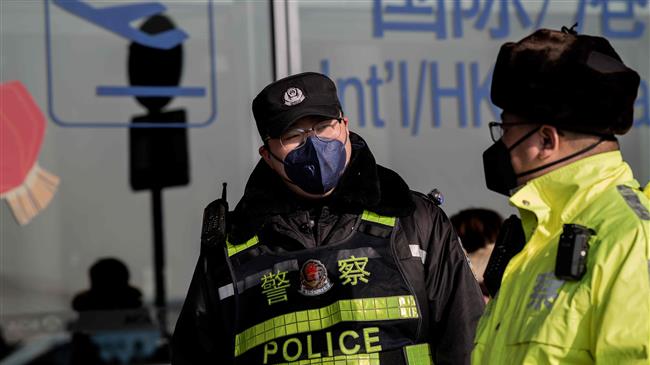China has warned a new virus that has infected hundreds of people across the country can mutate, as world countries take screening measures for travelers to prevent a global pandemic.

Health officials said Wednesday that it was clear "this virus is adapting and mutating."
National Health Commission Vice Minister Li Bin said at a news conference there "is the possibility of viral mutation and further spread of the disease."
The virus, which has so far killed nine people in China, originated in the central city of Wuhan, with a population of 11 million people, late last year, and has now infected more than 400 people in 13 Chinese provinces and municipalities, including in Beijing and Shanghai.
After it was confirmed that the virus is able to spread from humans to humans, officials in Wuhan called on people to avoid the city. They also cancelled a major Lunar New Year event to contain the outbreak of the illness.
Hundreds of millions of people are traveling in packed trains, planes, and buses across China for the holiday, which starts on Friday.
Wuhanís Mayor Zhou Xianwang urged residents not to leave the city so that the possibility of transmission could be reduced.
"If itís not necessary, we suggest that people donít come to Wuhan," Zhou also said.
Meanwhile, the National Health Commission announced measures to curb the spread of the virus, including disinfection and ventilation at airports and bus stations as well as inside planes and trains.
Police are also conducting spot checks for live poultry or wild animals in vehicles exiting and entering Wuhan.
Authorities set up fever scanners at Wuhanís train station and airport to check the temperature of people.
The government has classified the outbreak in the same category as the SARS epidemic. That necessitates compulsory isolation for those diagnosed with the disease.
"We will step up research efforts to identify the source and transmission of the disease," Li, the official at the National Health Commission, further said.
Meanwhile, Gao Fu, the director of the Chinese center for disease control and prevention, said they "already know that the disease originated from a market which conducted illegal transaction of wild animals."
"This might be the cause, so the disease could be on an animal, and then passed on from this animal to a human," he added.
Screening measures being adopted at airports globally
Countries across the world have been intensifying efforts to stop the spread of the pneumonia-like illness, as some cases have already been detected in the United States, Thailand, Japan, South Korea, and the Chinese territories of Macau and Taiwan.
The US Centers for Disease Control and Prevention (CDC) confirmed Tuesday it had detected the first case in Washington. The patient, who recently returned from a trip to Wuhan, was diagnosed on Sunday. He was isolated at the Providence Regional Medical Center in Everett and was in good condition, according to the CDC.
Secretary of Health for the State of Washington John Wiesman said that "the risk to the public is low."
Authorities are conducting measures at five US airports, including in San Francisco, Los Angeles and New York, for passengers arriving on direct or indirect flights from Wuhan. Passengers will only be allowed to enter the US from those five airports.
In Australia, health officials put a man who had recently traveled to Wuhan on isolation for necessary tests.
More than one million tourists from Australia visited china last year.
Two airports in the Russian capital, Moscow, also stepped up screening of travelers arriving from China on Tuesday.
India has also started checking the temperature of passengers arriving from China in seven airports, including in New Delhi, Mumbai, and Kolkata.
South Korean airports operating direct flights to Wuhan set up special gates for passengers in early January.
North Korea is also planning to temporarily ban foreign tourists, who are mainly Chinese, according to a foreign tour operator.
Other regional countries, including Singapore and Malaysia, also expanded travelersí temperature screenings at their airports.
The Bangladesh aviation watchdog ordered screenings for travelers arriving from China.
The World Health Organization (WHO) is set to hold an emergency meeting Wednesday to determine whether to declare a global public health emergency.
"Information about newly reported infections suggest there may now be sustained human-to-human transmission," said WHOís regional director for the western Pacific, Takeshi Kasai.
Experts from Imperial College London estimated the number of people infected could be far greater than official figures confirm. They suggested on Saturday that at least 1,723 people might have been infected.
Virus threatens world markets
Analysts warned that the new outbreak could develop into an economic risk, as it has already worried financial markets and investors, who fear it could deter Chinese consumers from traveling or shopping.
"The outbreak of a SARS-like coronavirus in Wuhan is developing into a major potential economic risk to the Asia-Pacific region now that there is medical evidence of human-to-human transmission," said Rajiv Biswas, the Asia-Pacific chief economist for IHS Markit.
The new virus, which causes a type of pneumonia, is similar to the Severe Acute Respiratory Syndrome (SARS) epidemic in China in 2002-2003. That virus, which was also coronavirus, killed nearly 800 people across the world, mostly in Asia.
LINK: https://www.ansarpress.com/english/13075
TAGS:






























 online news tv
online news tv




